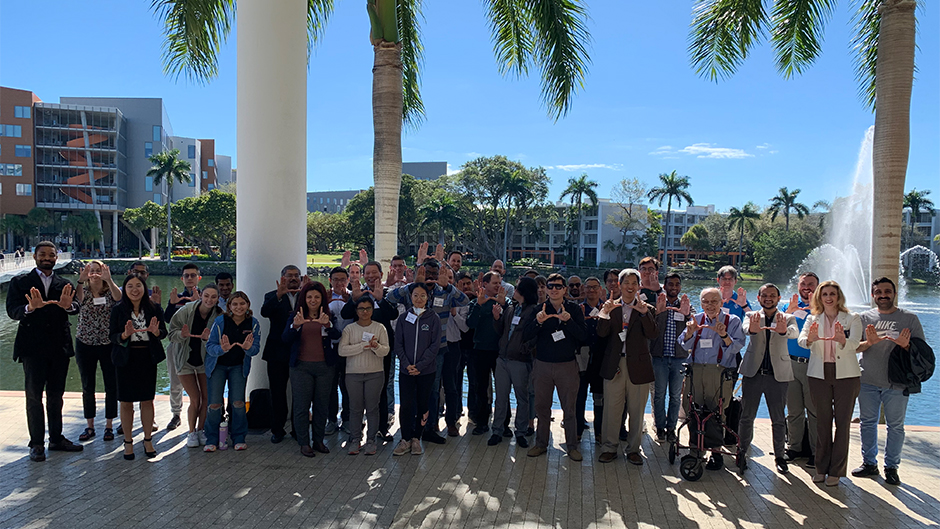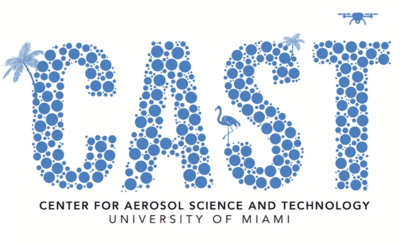A College of Engineering workshop on January 17-18, 2023, at the Shalala Student Center brought together experts in detecting aerosols and assessing their impacts on people, places, and materials. In addition, aerosol routes are used to synthesize nanomaterials, and researchers from industry and academia discussed their applications for energy and sustainability.
“Our first annual Miami Workshop on Aerosol Science and Technology showcased aerosol research in South Florida and promoted academic and industrial collaborative opportunities,” said Pratim Biswas, dean of the College of Engineering. “It was highly successful in convening leaders in multiple fields, including medicine, public health, air quality, atmospheric research, and materials science."

More than 60 students, faculty, government researchers, and industry professionals attended the two-day workshop, which was organized by the college’s Center for Aerosol Science and Technology (CAST) on January 17-18 at the Shalala Student Center. The two days included poster sessions, exhibits, and lab tours at the College of Engineering and the Rosenstiel School of Marine, Atmospheric, and Earth Sciences. Industry presenters included Handix Scientific Inc., Sailbri Cooper, and TSI Particle Instruments.
“Aerosols come in many sizes and from many sources, with an unimaginable number of potential applications,” said Biswas, who has conducted extensive research on airborne particles and led a tutorial on “Aerosol Fundamentals and Dynamics.” He also moderated the workshop session on “Nanoparticle Technology,” with Samiul Amin, professor of practice in the Department of Chemical, Environmental, and Materials Engineering.
Aerosols in South Florida
The first workshop session, “Aerosols in South Florida: Fires, Toxins, and Dusts,” was led by Paquita Zuidema, professor and chair of atmospheric sciences in the Rosenstiel School, and Jiayu Li, assistant professor of mechanical and aerospace engineering “Florida’s prescribed fire policy is interrupting the natural moisture cycle and reducing fire risks for the state,” said Christopher Holmes, associate professor at Florida State University. However, sugarcane burning raises health risks to neighboring communities, he added.
In that session, Cassandra Gaston, associate professor of atmospheric sciences, outlined a recent study that found dangerous aerosolized cyanotoxins can be emitted by red tide blooms in saltwater bodies such as the Gulf of Mexico.
Joseph M. Prospero, professor emeritus of the atmospheric science and the Cooperative Institute for Marine and Atmospheric Studies (CIMAS) and co-director of CAST, cited the significant impact of Saharan dust on South Florida and globally. “North Africa is the largest dust source in the world, and accounts for half of global dust emissions,” he said.
Other key topics
Chang-Yu Wu, professor and chair of the Department of Chemical, Environmental, and Materials Engineering and co-director of CAST, led a session on “Aerosol Health Effects,” while Yang Wang, assistant professor in the department, moderated a session on “Aerosol and Cloud Physics, and Instrumentation.”
Pramod Kulkarni, chief of the Chemical and Biological Monitoring Branch, National Institute for Occupational Safety and Health, Centers for Disease Control and Prevention, spoke on “Aerosol Exposure Measurement: Challenges and Opportunities.” He noted the importance of developing devices that can instantly read aerosol content and concentrations in a given place.
Chongai Kuang, atmospheric scientist at Brookhaven National Laboratory, spoke on “A Vision for Integrated Model-Observing System Design for Targeting Land-Aerosol-Cloud Interactions.”
Jiayu Li, assistant professor in mechanical and aerospace engineering, along with the CAST Student Chapter organized a vibrant Poster Session. Students had the opportunity to interact with leading researchers and discuss the results of their research.
This year the workshop was sponsored by Handix Scientific Inc., SailBri Cooper Inc. and TSI Inc.
A new hub for collaborative research and learning, the Center for Aerosol Science and Technology has eight core and multiple affiliated faculty members from the College of Engineering, the Rosenstiel School, and the Miller School. CAST focuses on the characterization of fundamental aerosol formation and transformation processes to determine the impacts of aerosols on the environment, climate, and human health and to utilize these processes to develop new materials to enable energy, environmental, and medical technologies. CAST will organize this workshop annually to discuss the latest developments in aerosol science and technology.


